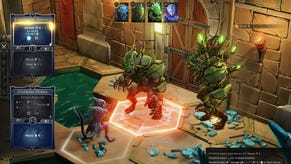No place for traditional publishers in digital market - Lau-Kee
"Blood-sucking leeches" bring nothing to digital distribution that developers can't do themselves, says Kerb and Unity exec
Traditional videogame publishers have no place in the digital distribution market, and have done themselves a disservice by taking advantage of the development community now spearheading growth in emerging online services.
That's the opinion of David Lau-Kee, co-founder of Renderware developer Criterion, ex-Electronic Arts VP and now an executive for browser games outfit Kerb Games and tools provider Unity.
"Traditional publishers are blood-sucking leeches who have no place in the future of digital distribution," said Lau-Kee, during a panel discussion on digital distribution held last night at BAFTA headquarters.
"If you look at what traditionally publishers have brought to the party – finance, marketing, distribution, taking a huge margin, and not necessarily in that order. And they own the IP as well."
What used to be considered publisher strengths – marketing games and established relationships with bricks and mortar retailers – are no longer important to a digital market, said Lau-Kee, who encouraged independent studios to bring as many aspects of the business in-house as possible.
"When it comes to traditional marketing, it's so yesterday in this new world. We no longer care about what authority tells us, the verticality of authority telling us to 'buy this' just doesn't work today at all," he said.
"Now we care about what our peers say, we care about what our friends are playing. That's what works. Guerilla and viral marketing is a huge part of that. There's nothing that traditional publishers can tell us about that type of marketing because a lot of it comes from grass roots."
He continued: "When it comes to channels, what they previously had was really nice relationships with retailers. Again, retailers are largely put to one side when it comes to digital distribution, so we don't need publishers for that either. There are some who are reinventing that are much more interesting, but it could be something that a developer can do itself. You really need to take a close look at what a publisher is going to bring other than finance."
Publishers that have left development partners disillusioned through questionable business practices and are unwilling to change their relationships with game makers won't see success in the digital market, said Lau-Kee.
"Anybody who's been in game development for some amount of time is gong to have legion of terrible stories about bad publishing deals and how they were ripped off or not paid. The publishing industry has done itself a huge disservice over the last 10 or 15 years"
Company's such as ngmoco, the iPhone publisher founded by another former EA exec Neil Young, is a good example of a business willing to address the change in relationships between publisher and developer, said Lau-Kee.
"I say traditional publishers because there are some who are looking to do it in a slightly different fashion and I think there's some validity there. It's not to say there hasn't been some great success stories, but publishers today are having to reinvent themselves."
"ngmoco is doing a great job of that. That's interesting because Neil Young came from a very traditional publisher, and said we'll do things in a different fashion, and one of those is figure out how we engage with the development community in a different way."
"There are other publishers out there who are trying to do different things as well," he offered. 2But a lot are completely unreconstructed, and I don't have the time of day for them at all. I think they miss the point entirely because when it comes to finance, maybe that's the only thing they can bring. But other models now are coming forward that no longer have you spending ten or15 million dollars to spend on a game, you can do it for much less than that."








